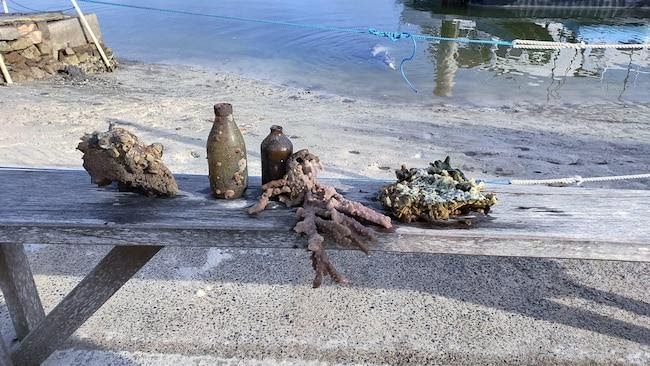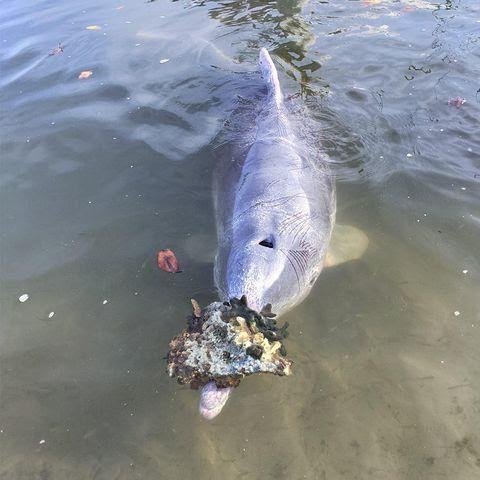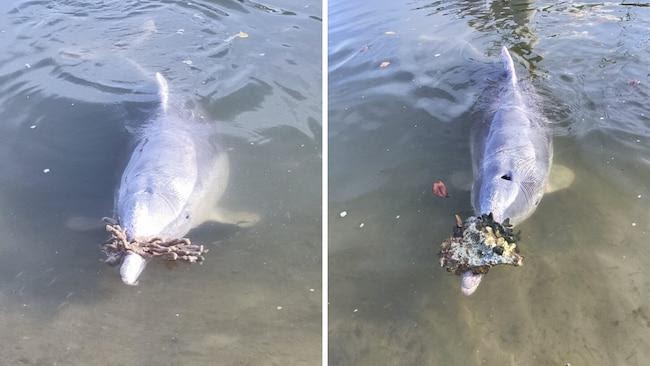How do you say, “Aww… thank you”, in Dolphin? These animals are just too sweet and there’s nothing we can do but love them every day. A pod of nine Australian humpback dolphins at a popular tourist spot in Queensland is reportedly delivering “gifts” to the staff and volunteers [1].
The friendly long-nosed creatures are used to being fed and played with by humans, but it’s been several weeks since they received any visitors due to the coronavirus restrictions. These days, it appears they are trying to interact with the few people they see by bringing them gifts from the sea.
The dolphins are esteemed residents at Barnacles Cafe & Dolphin Feeding at Tin Can Bay, north of the Sunshine Coast. Their wonderful gifts include sea sponges, corals, barnacle-encrusted bottles, reefs, and anything that seems like it might make the volunteers happy.
A post on the Café’s Facebook page read: “The pod has been bringing us regular gifts, showing us how much they’re missing the public interaction and attention. They are definitely missing you all.”
Read: This Man Was Only Filming Seagulls, but He Suddenly Captures an Incredible Once-In-A Lifetime Scene
A form of social interaction

The pod is led by the alpha male named Mystique, who would often bring the largest pieces of coral and glass bottles on his nose. Following closely behind would be the other members of his family – Patch, Ella, Harmony, Squirt, and four others.
According to reports from volunteers, the dolphins have been doing this for quite a long time. They’d occasionally swim up to the shores bearing hilarious gift items to be presented to their carers. However, the behavior seems to have been on the rise lately, possibly because they miss seeing people and getting pampered.
According to Dolphin expert Barry McGovern, the animals probably miss the snacks more than the humans.
“Nothing surprises me with dolphins and their behavior anymore. They do everything: They use tools, they have culture, they have something similar to names in signature whistles,” said McGovern, a Ph.D. student at the University of Queensland [2]. “In all likelihood, they probably don’t miss humans per se. They probably miss a free meal and the routine.”

Dolphins are notoriously gifted mimics and fast learners – they pick up human behavior very quickly and may have seen people gifting others in the past. They are highly intelligent and demonstrate traits like self-awareness, empathy, grief, and most of all, playfulness. Dolphins love their playtime more than anything.
“They often play with bits of weed and coral and all sorts of things and just leave it on their rostrum (nose). They’re used to getting fed now, so they’re used to humans coming in. When it’s not happening, maybe it’s just out of boredom,” McGovern said.
The Café has finally opened as lockdown restrictions were relaxed in Australia. They’ve since edited their initial post to alert the dolphin lovers: “Since the restrictions have eased we have been able to reopen the dolphin feeding & café. Put a smile on someone’s face and come spend some time to feed these beautiful creatures, they are definitely missing you all.”
Read: Dolphins appear to glow as they glide through bioluminescent waves
Protect the humpback dolphins
There are 42 species of dolphins presently identified in the world, and generally, their numbers are dwindling out in the wild waters. Some of the biggest threats these animals face include climate change, plastic pollution, fisheries bycatch, and offshore oil and gas developments, including seismic blasting [3]. Seismic blasting is one of the most controversial oil exploration methods where high-powered air guns are used to blast seafloors to map oil reserves. This often results in the injuring and killing of hundreds of aquatic animals within each working location.
The most common dolphin species in the wild is the bottlenose, and they are of “least concern” with over 600,000 still swimming the oceans and seas. However, humpbacks are facing a terrible fate. Each of the four species under this genus is flagged from “vulnerable to critically endangered” by the IUCN [4].
Australian humpback dolphin (Sousa sahulensis) – Vulnerable
Atlantic humpback dolphin (Sousa teuszii) – Critically endangered
Indian Ocean humpback dolphin (Sousa plumbea) – Endangered
Indo-Pacific humpback dolphin (Sousa chinensis) – Vulnerable
Their numbers are decreasing rapidly with only a few thousands of each species left in the wild. To protect the dolphins, the best thing we can do is to keep the ocean clean. Globally, 100,000 aquatic mammals die annually as a result of plastic pollution [5]. This includes dolphins, whales, porpoises, sea lions, and seals. They feed or choke on these items and it’s a sad reality to imagine how they suffocate due to human carelessness. We need stronger policies to prevent the poaching of dolphins and the use of chemicals in fishing.
Dolphins are one of nature’s blessings to humans, and we have to help keep them safe. Here are some resources to learn more about the dangers they face and how to help:
NOAA Fisheries: Protect Wild Dolphins: Admire Them from a Distance.
The Dolphin Project: 10 WAYS TO HELP PROTECT THE OCEANS
WWF: Plastic in our oceans is killing marine mammals
ASCOBANS: What You can Do to Protect Whales, Dolphins and Porpoises!
Keep Reading: Fish recorded singing dawn chorus on reefs just like birds
- Dolphins bring gifts from sea in apparent response to lack of human interaction during pandemic isolation: Video. Penn Live. https://www.pennlive.com/coronavirus/2020/05/dolphins-bring-gifts-from-sea-in-apparent-response-to-lack-of-human-interaction-during-pandemic-isolation-video.html Retrieved 15-06-2020
- Digital Staff. Dolphins bring gifts from sea in apparent response to lack of human interaction. 7 News Australia. https://7news.com.au/news/wildlife/dolphins-bring-gifts-from-sea-in-apparent-response-to-lack-of-human-interaction-c-1049565 Retrieved 15-06-2020
- Dolphin Threats. See The Wild. https://seethewild.org/dolphin-threats/ Retrieved 15-06-2020
- https://www.iucnredlist.org/search?query=Humpback%20Dolphin&searchType=species Retrieved 15-06-2020
- https://www.wwf.org.au/news/blogs/plastic-in-our-oceans-is-killing-marine-mammals#gs.8qdgxt

